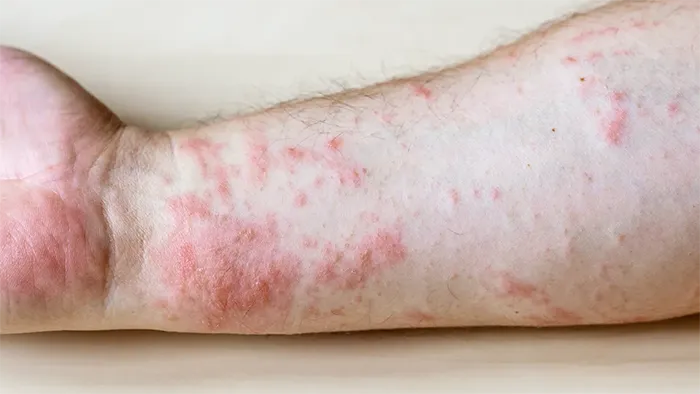The body needs a variety of vitamins and minerals for optimal functioning. One of these essential minerals is zinc, which is found in small amounts in food and is an essential trace nutrient found in all cells. Most of its quantity is stored in the muscles and bones, and it is also found in hair, eyes, nails, skin, liver, prostate, and testes. The body uses zinc for:
- Strengthening the immune system
- Helping in cell division
- Maintaining the sense of smell and taste on the tongue
- Increasing the speed of wound healing
Zinc also helps in growth, and it is an essential mineral for pregnant women and growing children. If you do not get enough zinc through food, you may develop symptoms such as hair loss, decreased alertness, and loss of smell and taste.
Doctors may diagnose a zinc deficiency based on the person’s circumstances, symptoms, and response to zinc supplements. To treat a zinc deficiency, a doctor may prescribe zinc supplements.
How much zinc should be taken daily?
Zinc is an essential mineral for the body and regular consumption is necessary. The recommended amount of zinc may vary based on age, gender, pregnancy, and other conditions.
What are the symptoms of zinc deficiency?
Due to a deficiency of zinc, the following symptoms can develop in the body:
- Breast cancer
- Prostate cancer
- Sinusitis
- Allergies
- Loss of appetite
- Diarrhea
- Dry skin
- Eye infections
- Hair loss
- Sexual dysfunction or impotence
- Skin rashes
- Brittle nails
- Marks on fingernails
- Dandruff
- Short stature
- Weakened immune system
- Insomnia
- Infertility
- Loss of sense of smell or taste on the tongue
- Decreased libido
- Frequent colds
When should a doctor be seen?
In most cases, zinc deficiency does not cause an emergency. If you are pregnant or lactating and think you are deficient in zinc, it is important to see a doctor. Zinc is a vital mineral for the healthy development of the fetus.
If you know that you are deficient in zinc and have diarrhea for a few days, seek help from a doctor. Zinc helps the gut fight off infections, and without it, infections can become more severe.
You should talk to your doctor if you experience any of these problems:
- Feeling dizzy and nauseated
- Sudden headache that doesn’t get better
- Fainting spells.
What is the reason for zinc deficiency?
There are three main factors that can cause a decrease in internal zinc levels in the body:
- Not getting enough zinc from food
- Excess zinc excretion from the body due to an absorption process defect
- Chronic conditions
Zinc deficiency may occur in people with the following long-term conditions:

- Vegetarians: Vegetarians are often deficient in zinc as the zinc found in meat is easily broken down by the body. While they eat a lot of healthy foods such as fruits, soybeans, beans, dried fruits, and whole grain products, these foods impair the body’s ability to absorb zinc as they bind to zinc, making it unavailable for absorption.
- Age: Older individuals are at a higher risk of zinc deficiency as they either don’t eat a wide variety of foods or can’t include them in their diet. Some types of medication, such as blood pressure medicine (diuretics), also take more zinc from the body.
- People with chronic conditions such as chronic kidney disease, liver disease, Crohn’s disease, diabetes, pancreatic diseases, sickle cell disease, ulcerative colitis, and celiac disease are at a higher risk of zinc deficiency. Additionally, babies who are breastfeeding and pregnant women, who require more zinc than normal women for the development of the growing fetus, are also at risk. People with drug addiction and those who drink alcohol are also at a higher risk of zinc deficiency as alcohol makes it difficult for the body to absorb zinc.
How to prevent zinc deficiency?
To prevent zinc deficiency, consider making dietary changes and eating more of the following foods: ginger, oats, groundnut, almonds, walnuts, legumes, red meat, chicken, seeds, wheat sprouts, and wild rice.
If you’re a vegetarian, consider alternative sources of zinc such as baked beans, cashews, peas, and almonds. To increase zinc absorption from legumes, soak them in water before cooking. Fermented grain products can also increase the amount of zinc in the body.
How can I correct my zinc deficiency?
If you are concerned about a zinc deficiency, your doctor will examine your symptoms and order blood tests if necessary. A combination of your symptoms and a blood test can give your doctor a much better indication of whether you have a zinc deficiency.
To diagnose a zinc deficiency in the body, the doctor needs complete medical information about you. They may ask questions about your food habits. If a person doesn’t consume enough calories per day or a variety of foods, a zinc deficiency may be the underlying cause.
Although doctors order urine or blood tests to check zinc levels, these do not provide definitive results. This is because zinc is only found in small amounts in the body’s cells.
Sometimes, a zinc deficiency can also be a symptom of another condition. For example, some conditions can cause zinc to be processed but not absorbed well in the body. Zinc deficiency can also lead to a copper deficiency. The doctor is aware of these possibilities and may perform additional tests to determine the cause of the zinc deficiency.
Zinc Deficiency Treatment:
Zinc deficiency is treated by addressing its underlying cause. Once the cause is found, the problem of zinc deficiency will typically resolve on its own. Treatment may also include zinc supplements, depending on the level and cause of the deficiency.
In some cases, dietary advice and supplementation of other essential elements may be required.
What happens to your body when you start taking zinc?
You can treat your zinc deficiency with supplements. Zinc is found in many multivitamin supplements and in some cold medicines. However, if you are not sick, you should not take cold medicines. You can also purchase supplements that only contain zinc.
Be cautious when using supplements to increase the amount of zinc in your body as zinc can interfere with the effectiveness of antibiotics, diuretics, and arthritis medicines.
Which diseases can be caused due to deficiency of zinc?
Weakened Immune System: If you have a weakened immune system, frequent illness may be your first symptom. The immune system protects our body from infections and diseases, and a lack of essential nutrients, including zinc, can greatly affect it. Zinc also helps reduce excessive swelling and inflammation associated with conditions such as asthma, allergies, heart disease, cancer, premature aging, and others.
Impairment of Tongue’s Sense of Smell and Taste: Adequate levels of zinc are needed to produce enzymes necessary for taste and smell. Decreased experience of smell and taste can indicate zinc deficiency.
Slow-Growing or Damaged Nails: Zinc is important for cell division, growth, and wound healing, so a lack of it can lead to damaged nails and hair. Cells in the skin, hair, and nails require stable levels of zinc to maintain healthy growth.
Skin Conditions: Acne, rashes, and other skin problems can indicate low zinc levels. Zinc interacts with vitamin A levels and can increase them, which is also important for healthy skin.
Poor Wound Healing: If your wounds take longer than usual to heal, it may be a sign that you need to add zinc-rich foods to your diet. Zinc helps cells divide and grow, so without it, healing may take longer.
Decreased Vision: If you are having trouble seeing, especially at night, consider adding zinc to your diet.
Poor Memory and Attention Span: Zinc improves memory and learning ability.
Depression or Stress: Zinc also plays an important role in fluctuating brain waves, which the body processes as stress. A deficiency in zinc has been found in people with depression or stress, and taking zinc supplements has been shown to have antidepressant effects. Treatment with antidepressants usually restores normal zinc levels.
Infertility and Poor Pregnancy Outcome: Another consequence of abnormal development is decreased fertility. Although zinc deficiency alone may not affect fertility, zinc plays a crucial role in the proper functioning of the reproductive system.

